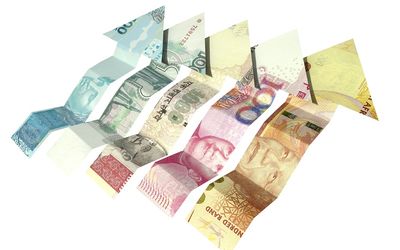CAPE TOWN — South Africa had made a strong and "compelling" case for the New Development Bank to be established by the Brics (Brazil, Russia, India, China and South Africa) countries to be based in Johannesburg, Trade and Industry Minister Rob Davies said in Parliament on Friday ahead of a meeting next week.
The heads of state and ministers of the member countries will meet at a summit in Fortaleza, Brazil, next week.
Johannesburg is pitted against rival Shanghai in the bid to be home to the new bank, with New Delhi a possible latecomer to the race. Despite reports to the contrary, no decision had yet been made about where to locate the bank, Mr Davies said.
South Africa’s main argument to be home to the bank, the minister said, was that being located in Africa would facilitate the bank’s investment in infrastructure projects such as transport logistics, which were fundamental for successful regional integration. The continent also needed investment in its productive capacity. Major developments were under way in this regard but there was a significant funding gap.
"Being located in South Africa would be a huge advantage from the point of view of the efficacy of the bank to fulfil that role on the African continent," the minister said.
South Africa had a "robust and significant financial sector" that had evolved into Africa.
The decision on where to locate the bank, its capital structure, reserve arrangements and the nature of its currency pool would be decided by the heads of state.
Mr Davies said the bank’s investment mandate would not be limited to Brics countries, but would include African countries as well.
A study commissioned by South Africa on co-operation in value-added trade and investment between Brics countries will be discussed by the trade ministers as well as trends with regards to international investment agreements.
Mr Davies said there were many areas in which the Brics countries were direct competitors in terms of trade but others in the area of value-added products where they were complementary and could co-operate.
The Department of Trade and Industry is finalising its own bill on international investment promotion, which will replace its bilateral treaties with several countries.
China will also table proposals on voluntary measures for trade facilitation and customs harmonisation.
Mr Davies was adamant that the existence of the Brics organisation had assisted co-operation between the nations involved and had made a difference to trade "despite the headwinds facing the world".
The implementation of the trade facilitation measures in the Bali package of the World Trade Organisation agreement and the difficulties this would pose for African countries in the absence of financial and technical support would also be on the agenda, Mr Davies said.
Also up for discussion will be a report of the Brics business council, which consists of five business representatives from each country and was chaired by billionaire mining magnate Patrice Motsepe while South Africa was the chair of Brics. The report focuses on what governments can do to facilitate business interaction between Brics countries and the opportunities that exist for collaboration in the aircraft industry, for example.

Picture: THINKSTOCK
CAPE TOWN — South Africa had made a strong and "compelling" case for the New Development Bank to be established by the Brics (Brazil, Russia, India, China and South Africa) countries to be based in Johannesburg, Trade and Industry Minister Rob Davies said in Parliament on Friday ahead of a meeting next week.
The heads of state and ministers of the member countries will meet at a summit in Fortaleza, Brazil, next week.
Johannesburg is pitted against rival Shanghai in the bid to be home to the new bank, with New Delhi a possible latecomer to the race. Despite reports to the contrary, no decision had yet been made about where to locate the bank, Mr Davies said.
South Africa’s main argument to be home to the bank, the minister said, was that being located in Africa would facilitate the bank’s investment in infrastructure projects such as transport logistics, which were fundamental for successful regional integration. The continent also needed investment in its productive capacity. Major developments were under way in this regard but there was a significant funding gap.
"Being located in South Africa would be a huge advantage from the point of view of the efficacy of the bank to fulfil that role on the African continent," the minister said.
South Africa had a "robust and significant financial sector" that had evolved into Africa.
The decision on where to locate the bank, its capital structure, reserve arrangements and the nature of its currency pool would be decided by the heads of state.
Mr Davies said the bank’s investment mandate would not be limited to Brics countries, but would include African countries as well.
A study commissioned by South Africa on co-operation in value-added trade and investment between Brics countries will be discussed by the trade ministers as well as trends with regards to international investment agreements.
Mr Davies said there were many areas in which the Brics countries were direct competitors in terms of trade but others in the area of value-added products where they were complementary and could co-operate.
The Department of Trade and Industry is finalising its own bill on international investment promotion, which will replace its bilateral treaties with several countries.
China will also table proposals on voluntary measures for trade facilitation and customs harmonisation.
Mr Davies was adamant that the existence of the Brics organisation had assisted co-operation between the nations involved and had made a difference to trade "despite the headwinds facing the world".
The implementation of the trade facilitation measures in the Bali package of the World Trade Organisation agreement and the difficulties this would pose for African countries in the absence of financial and technical support would also be on the agenda, Mr Davies said.
Also up for discussion will be a report of the Brics business council, which consists of five business representatives from each country and was chaired by billionaire mining magnate Patrice Motsepe while South Africa was the chair of Brics. The report focuses on what governments can do to facilitate business interaction between Brics countries and the opportunities that exist for collaboration in the aircraft industry, for example.






















Change: -0.47%
Change: -0.57%
Change: -1.76%
Change: -0.34%
Change: 0.02%
Data supplied by Profile Data
Change: -1.49%
Change: -0.04%
Change: -0.47%
Change: 0.00%
Change: 0.08%
Data supplied by Profile Data
Change: 0.16%
Change: 0.61%
Change: 0.12%
Change: -0.29%
Change: 0.82%
Data supplied by Profile Data
Change: 0.21%
Change: -0.42%
Change: 0.20%
Change: -1.22%
Change: -0.96%
Data supplied by Profile Data